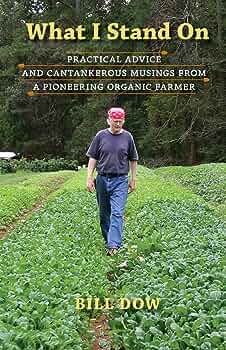Book review by Stephanie Campbell, CFSA Outreach Coordinator. Photos by Debbie Roos.
Have you ever wished you could sit down with a wise elder farmer and wile away the afternoon listening to farming stories?
To hear, firsthand, all of the tips and techniques he learned over a lifetime of organic farming?
To learn about when farmers markets were a new idea and how the local food movement grew.
To hear how he dealt with drought and deer, disease, pests, and crop failures, as well as the pure joy of sharing bumper crops of delicious, nutrient-dense, organic vegetables directly with the community he knows and loves.
Whether you want to farm yourself, or if you are an eater who wants to understand where your food comes from, you will want to read, What I Stand On: Practical Advice & Cantankerous Musings from a Pioneering Organic Farmer.
In the book, Bill Dow, the first certified organic farmer in North Carolina, shares the stories of his lifelong food activism and path-breaking farming methods in the Triangle region of North Carolina.
His book is a feast for all those who care about food, farming, and our future.
The book was compiled by Bill’s friend and former CFSA Education Director, Fred Broadwell, through hours of afternoons and evenings spent listening to and recording Bill’s memories and musings. Always intended to be edited and completed by Bill himself, it became a labor of love for Fred following Bill’s untimely death in December 2012.
Fred kept much of the book in Bill’s voice so that you can become one of the many friends Bill continues to mentor and influence through his legacy.

Who was Bill Dow?
Bill was a trained physician who became a farmer. His experience growing up on a conventional family farm in Mississippi, training as a doctor in the sixties, establishing health clinics in rural Appalachia, and community organizing, led to organic farming in Pittsboro, NC.
His story is a fascinating one of a man who lived what he believed in and changed our world in the process. Decades before the blossoming of the local food movement, he founded farmers markets, sold directly to restaurants, and experimented with organic methods.
“I don’t regret being a farmer, far from it,” Bill says in the book. “If there’s no agriculture, there’s no civilization. The bubonic plague can sweep through, kill millions, and we can recover from that. If we inadvertently wipe out the ability to grow food, it’s over.”

Bill believed that farming was a calling—a productive, learning, artistic experience—and he always had a collection of young people working on the farm and learning from him.
“Bill was a teacher before anything else,” said Ms. Daryl Walker, his partner for the last decade of his life. “He loved to teach young people and his dream for the book was that it would show a realistic picture of the long slog of farming, the day-to-day work and worry, as well as pass along his passion for growing and the satisfaction of the life of a farmer.”
“I don’t regret being a farmer, far from it.”
In recognition of Bill’s commitment to shaping farmers, in 2013 the Carolina Farm Stewardship Association created the William W. Dow Scholarship. The fund provides scholarships to Black, Indigenous, and Farmers of Color of all experience levels and beginning farmers to attend CFSA’s annual Sustainable Agriculture Conference, the premier forum for networking and education for local and organic agriculture in the Carolinas.
On average, between 20 and 30 scholarships are awarded each year.
“To farm, some people would say, is very foolhardy,” Bill mused, “Verging on stupid. ‘What the hell are you doing? You could be seeing patients!’ But I love farming. I love that I can supply healthy food to lots of people. I love that I can mentor young people and be a good employer. I love that I can steward the water and the land. I love that I can grow things out of the soil. That’s what I stand on.”



